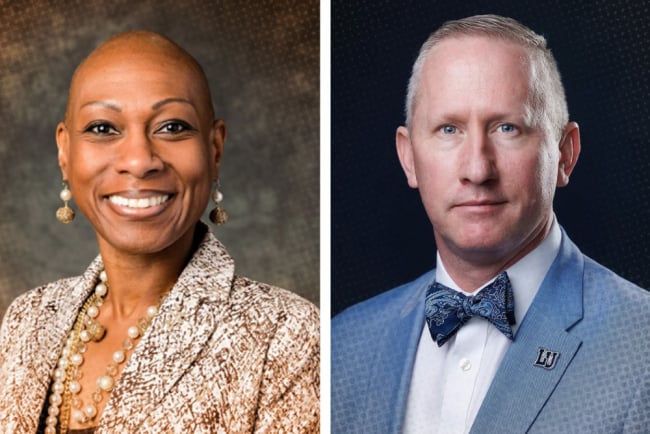You have /5 articles left.
Sign up for a free account or log in.

Lincoln University President John Moseley has returned to his role after an investigation concluded he hadn’t bullied Antoinette “Bonnie” Candia-Bailey, an administrator who died by suicide earlier this year.
Lincoln University
The alumni association of Lincoln University of Missouri recently issued a statement of no confidence in the university’s Board of Curators after it reinstated John Moseley as president.
Moseley took voluntary administrative leave in January amid a third-party investigation into his treatment of Antoinette “Bonnie” Candia-Bailey, the university’s vice president of student affairs, who died by suicide earlier this year and accused him of bullying her in a letter she wrote to him on the day of her death and also sent to board members and some fellow alumni. The investigation concluded that no bullying had taken place. But students and alumni at the close-knit historically Black university, still emotionally raw from the incident, remain unconvinced.
“During this exhaustive, independent investigation, no evidence was found that Dr. Moseley bullied Dr. Candia-Bailey,” Victor B. Pasley, president of the Board of Curators, wrote in an open letter to the campus last week.
“Based on this report, we are confident that President Moseley has not, and does not, engage in bullying or harassment of Lincoln University employees,” he added.
Sherman Bonds, president of the Lincoln University Alumni Association, issued a statement questioning the investigation’s findings and accusing the board of causing “irrevocable harm, shame, hopelessness, and mortification to our beloved University.”
Moseley, who has resumed his role, said in a press release that “our thoughts and prayers have been and continue to be with Dr. Bailey’s family, friends, and our campus community.”
“There is not a lot I can say about the independent report and its findings,” he said, but he thanked the board for “their faith in me and their vote of confidence.”
“I’ve had time to reflect and to discuss my future and that of the University with my family and members of the Lincoln University community,” he added. “I care deeply for this University, its mission, our students, staff and faculty and I look forward to returning from administrative leave to resume my duties as President.”
Kenlyn Washington, president of the university’s Student Government Association, said emotions about the suicide “spiked back up” on campus since Moseley’s return. She and other students found the investigation results “very saddening” and are considering protesting.
“I don’t have a sense of peace of how do we move forward,” she said, “because the university is hurting.”
A Campus in Mourning
Candia-Bailey’s death has left the campus reeling since January. The story also struck a chord nationwide with many Black women in academia who saw her suicide and allegations against Moseley, who is white, as a symbol of the workplace pressures and disrespect they also experience.
Candia-Bailey sent an anguished 12-page letter to Moseley the morning of her suicide that indicated he had caused her “mental damage” and “harm” by bullying her and failing to help her improve after a poor evaluation while aware of her mental health challenges. It also noted she had previously sought and not been granted leave due to “severe anxiety and depression” under the Family Medical Leave Act, which allows employees to take time off for various reasons including a health condition affecting their performance.
A termination letter obtained by Inside Higher Ed shows she had been fired the week prior to her death.
“Lincoln is where it started for me and where it ended,” Candia-Bailey wrote in the letter to Moseley.
Lewis Rice LLC, the law firm hired by the Board of Curators, to investigate the matter, found “no evidence” of bullying after reviewing “thousands of pages of documents” including email exchanges, text messages and university policies and memos, and conducting “dozens of hours of interviews” with 24 Lincoln University employees, according to the letter from Pasley. The investigation also concluded that Candia-Bailey did not qualify for leave under the Family Medical Leave Act because she had been at the university for less than a year, though the university “responded appropriately,” and in accordance with the Americans with Disabilities Act, to other requests for accommodations such as remote work.
Pasley also acknowledged that Moseley’s style has been described as “direct” and the investigation “did find that some workplace stress existed, leading to strained relationships among and between University employees, including those in senior leadership positions.” The board promised to work with Moseley on “improvements to staff operations and increased staff training and resources.” It also created a “university wellness committee” to focus on bolstering student and employee mental health resources, including “employee health risk assessments aimed at earlier diagnoses of employees’ health needs.”
The letter emphasized that the report’s outcome “does not make Dr. Candia-Bailey’s death any less tragic or painful” and her suicide “rightfully” led to calls for change to “systemic issues at our University” that predate Moseley’s tenure and racial disparities in mental healthcare.
The board also released a redacted version of the report’s executive summary, which furnished more details about the investigation, including that the firm conducted in-person and Zoom interviews over a two-week period with employees who had the “closest working relationships” to Candia-Bailey and Moseley, including five board members. Pasley’s letter noted that the executive summary was redacted to not include any private personnel information or Candia-Bailey’s medical details, but the board has asked the Missouri Attorney General’s Office to advise them on whether the full report should be made available under the Missouri Sunshine Law, which requires public governmental bodies in the state to have open records.
“Dr. Candia-Bailey’s death by suicide is beyond tragic and unfortunate for many, including Dr. Candia-Bailey’s family and University employees who clearly cared about her and are devastated by her death,” the report read. “The University, however, did not fail to accommodate Dr. Candia-Bailey in violation of the ADA, and the allegations in her letter that Dr. Moseley bullied her are unsubstantiated.”
The Aftermath
Bonds doesn’t trust the investigation’s results.
He said the decision to reinstate Moseley based on an investigation that included some of the board member's own testimonies doesn’t seem “exactly kosher” to him. Pasley’s wording about Moseley's “direct” approach and “workplace stress” also sounded like possible euphemisms for a “toxic environment,” he added.
Washington, the student leader, was also unconvinced by the investigation’s results. She worries campus employees interviewed “might fear for their jobs,” which could have affected their testimonies, and she finds it “frustrating” to see Candia-Bailey’s feelings and account of what happened invalidated.
Rod Chapel, president of the Missouri NAACP State Conference who is currently serving as special counsel to the Board of Curators, said the pain of Candia-Bailey’s death is “going to be with the school forever.”
However, he believes the investigation and the reasoning behind the board’s decision have been transparent and thorough.
“I understand that there may be some differing viewpoints, and I think that the board has been very open and candid about their willingness to engage and talk about that,” said Chapel, noting that the board held listening sessions with students and has been in communication with alumni. “The reality is that there’s been an investigation that’s shown that the bullying that was complained of by Dr. Candia-Bailey was not founded.”
Bonds said some alumni will likely “embrace” Moseley again and believe “he was dealt a bad hand,” but as far as he’s concerned, Candia-Bailey’s death still “happened on his watch.”
This isn’t the first time Moseley has been under scrutiny by some alumni. They’ve previously raised concerns about his inexperience as an academic. Moseley was formerly the university’s athletics director and head men’s basketball coach before becoming president in 2022. He completed his doctorate in educational leadership and policy analysis at the University of Missouri in 2021.
Some critics of Moseley’s reinstatement have also noted on social media that he’s one of the few white presidents heading historically Black colleges and universities. According to a 2023 report by the American Council on Education, only 3.5 percent of HBCU leadership were white. He also previously raised eyebrows among some alumni by describing Lincoln as both an HBCU and a “regional” university, located in predominantly white central Missouri, at a time when white students make up 40 percent of the university’s student population.
Bonds said he’s concerned about Moseley’s “skillset,” not his “skin color,” and believes those assuming otherwise take attention away from the real issues at hand.
"We don’t want somebody that doesn't have the skills to do the job,” he said.
Chapel also argued that Moseley being white is irrelevant. He noted that Lincoln was founded by Black soldiers who fought in the Civil War with the support of white officers and that the NAACP was similarly founded in partnership with white collaborators. He defended Moseley’s leadership, noting that most faculty members received salary increases under his leadership this academic year and that he secured $2.1 million from the state legislature to put university employees on the state employee health insurance plan.
Chapel said helping the university move forward and continue toward its goals is going to be a “task” for Moseley, “but I think he’s got a proven track record of working with the university to make sure that the goals and objectives are met.”
Victor Armstrong, vice president for health equity and engagement at the American Foundation for Suicide Prevention, said the most critical thing campus leaders can do after a campus suicide is provide opportunities for staff and students to grieve and help them transition back to routines as quickly as possible.
Armstrong, an HBCU graduate, noted that recovery steps after a campus suicide can “look different” at HBCUs, because people of color have historically been left out of suicide research and Black students tend to think of suicide as a “white problem.”
“For students on an HBCU campus, often one of the first things you have to do is deal with the shock,” the sense that “this is not something that’s supposed to happen in our world,” he said.
Bonds said his world, and that of other alumni and students, has certainly been shaken.
“I believe we are the victims now,” he said. “We are the ones who carry the burden of shame. We’re the ones who carry the burdens of hopelessness. We’re the ones who carry the burden now of injustice. That was no justice for Bonnie by the Board of Curators in the manner in which they did it.”
If you or someone you know are in crisis or considering suicide and need help, call the 988 Suicide & Crisis Lifeline by dialing 9-8-8, or the Crisis Text Line by texting HOME to 741741.





